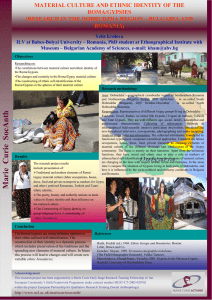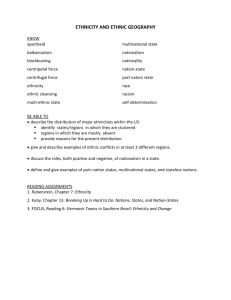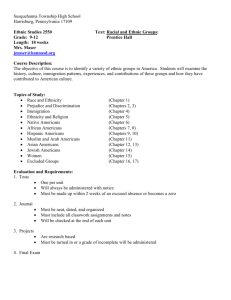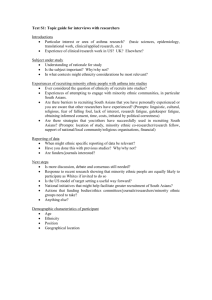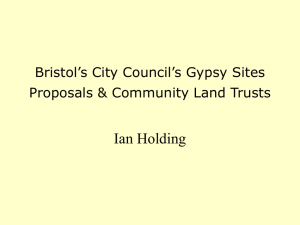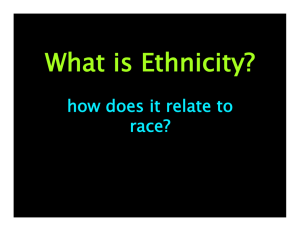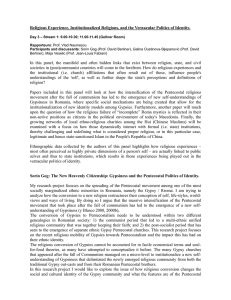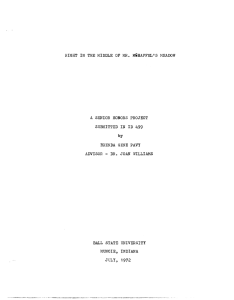Central Quotation: „Here ethnic minority recognition would still
advertisement
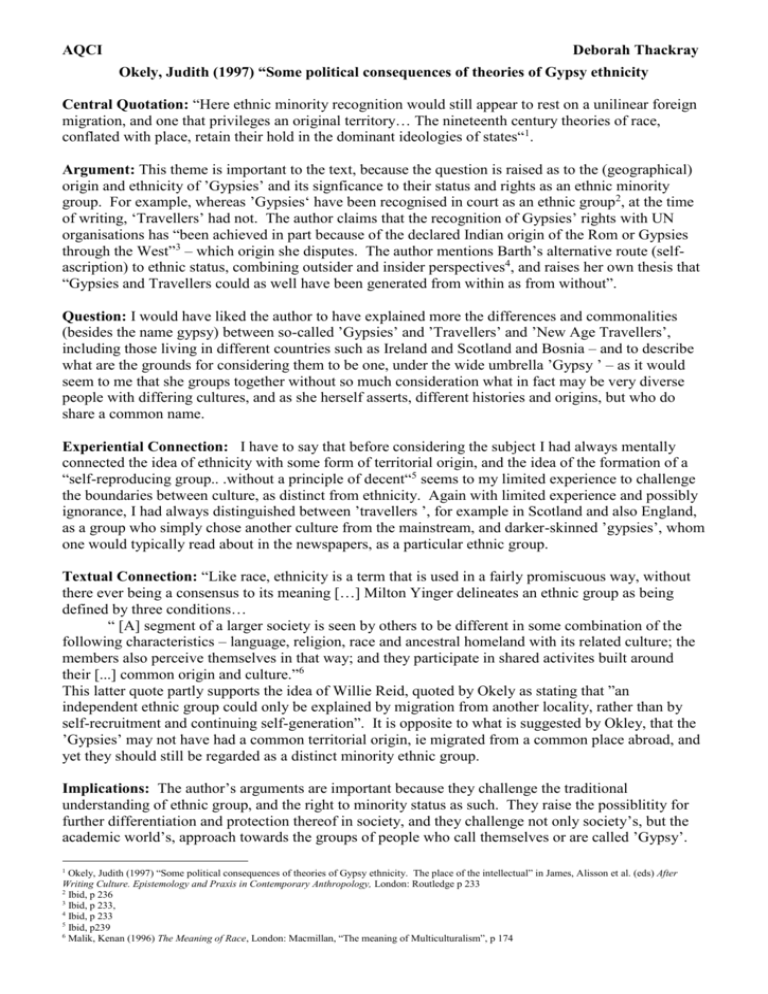
AQCI Deborah Thackray Okely, Judith (1997) “Some political consequences of theories of Gypsy ethnicity Central Quotation: “Here ethnic minority recognition would still appear to rest on a unilinear foreign migration, and one that privileges an original territory… The nineteenth century theories of race, conflated with place, retain their hold in the dominant ideologies of states“1. Argument: This theme is important to the text, because the question is raised as to the (geographical) origin and ethnicity of ’Gypsies’ and its signficance to their status and rights as an ethnic minority group. For example, whereas ’Gypsies‘ have been recognised in court as an ethnic group2, at the time of writing, ‘Travellers’ had not. The author claims that the recognition of Gypsies’ rights with UN organisations has “been achieved in part because of the declared Indian origin of the Rom or Gypsies through the West”3 – which origin she disputes. The author mentions Barth’s alternative route (selfascription) to ethnic status, combining outsider and insider perspectives4, and raises her own thesis that “Gypsies and Travellers could as well have been generated from within as from without”. Question: I would have liked the author to have explained more the differences and commonalities (besides the name gypsy) between so-called ’Gypsies’ and ’Travellers’ and ’New Age Travellers’, including those living in different countries such as Ireland and Scotland and Bosnia – and to describe what are the grounds for considering them to be one, under the wide umbrella ’Gypsy ’ – as it would seem to me that she groups together without so much consideration what in fact may be very diverse people with differing cultures, and as she herself asserts, different histories and origins, but who do share a common name. Experiential Connection: I have to say that before considering the subject I had always mentally connected the idea of ethnicity with some form of territorial origin, and the idea of the formation of a “self-reproducing group.. .without a principle of decent“5 seems to my limited experience to challenge the boundaries between culture, as distinct from ethnicity. Again with limited experience and possibly ignorance, I had always distinguished between ’travellers ’, for example in Scotland and also England, as a group who simply chose another culture from the mainstream, and darker-skinned ’gypsies’, whom one would typically read about in the newspapers, as a particular ethnic group. Textual Connection: “Like race, ethnicity is a term that is used in a fairly promiscuous way, without there ever being a consensus to its meaning […] Milton Yinger delineates an ethnic group as being defined by three conditions… “ [A] segment of a larger society is seen by others to be different in some combination of the following characteristics – language, religion, race and ancestral homeland with its related culture; the members also perceive themselves in that way; and they participate in shared activites built around their [...] common origin and culture.”6 This latter quote partly supports the idea of Willie Reid, quoted by Okely as stating that ”an independent ethnic group could only be explained by migration from another locality, rather than by self-recruitment and continuing self-generation”. It is opposite to what is suggested by Okley, that the ’Gypsies’ may not have had a common territorial origin, ie migrated from a common place abroad, and yet they should still be regarded as a distinct minority ethnic group. Implications: The author’s arguments are important because they challenge the traditional understanding of ethnic group, and the right to minority status as such. They raise the possiblitity for further differentiation and protection thereof in society, and they challenge not only society’s, but the academic world’s, approach towards the groups of people who call themselves or are called ’Gypsy’. Okely, Judith (1997) “Some political consequences of theories of Gypsy ethnicity. The place of the intellectual” in James, Alisson et al. (eds) After Writing Culture. Epistemology and Praxis in Contemporary Anthropology, London: Routledge p 233 2 Ibid, p 236 3 Ibid, p 233, 4 Ibid, p 233 5 Ibid, p239 6 Malik, Kenan (1996) The Meaning of Race, London: Macmillan, “The meaning of Multiculturalism”, p 174 1
